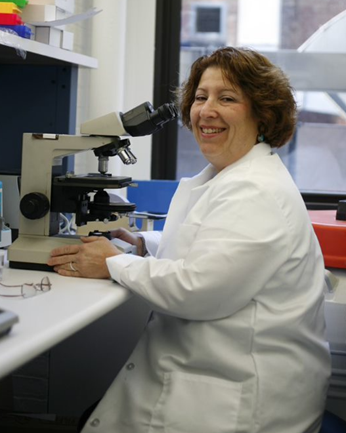This March, New York Blood Center Enterprises celebrated the career of Rona Singer Weinberg, PhD. Surrounded by her husband, two daughters and sons-in-law, many friends, and colleagues, Weinberg accepted appreciation for her many contributions over 20 years with the organization, including her instrumental role in the formation of Comprehensive Cell Solutions (CCS). Under her direction, a lab staffed with just two technologists making 100 products per year soon became a trusted, high-yield operation sought by customers and former colleagues alike. Fulfilling a critical unmet need, today’s CCS is a robust manufacturing organization serving clients from hospitals, academia, large pharma and the biotechnology industry. A staff of 18 technologists delivers more than 1000 cell therapies annually. Continued enterprise investment and Weinberg’s scientific oversight ensure CCS’s future as a premier partner for cell therapy development and cGMP manufacturing.

The start of a prolific career
Long before STEM was “a thing”, Rona Singer Weinberg was destined for life as a scientist. She had always been fascinated by concepts in biology, perhaps unusual for a girl growing up in New York City in the early 60’s, but the adults in her life encouraged pursuit of her passion. In addition to her parents, Brooklyn College professor Donald Hurst supported her ambitions. Seeing Rona’s passion and potential, he insisted she apply for admission and scholarship at Mount Sinai School of Medicine. She was awarded both and soon found herself working toward and earning a PhD in Biomedical Science. Through various appointments, Rona enjoyed a decades-long tenure at in the Hematology laboratory and classrooms at Mt. Sinai, where she influenced and mentored many. In these early days, her exposure to physician researchers and their patients paved the way for her life’s work studying the biology of blood, related disorders, and therapeutic treatment.
When world renowned hematologist Ronald Hoffman asked Rona to take the lead for the Tissue Bank core of a new research consortium, she rose to the challenge. In 2006, the National Cancer Institute awarded her application with a grant that has earned renewal ever since. Over the past 15 years, the bank has become the world’s largest repository of tissues from myeloproliferative neoplasm (MPN) patients, allowing researchers to access longitudinal data that is key to understanding the disease mechanisms of action. In laymen’s terms, MPNs are a group of chronic leukemias that have the potential to progress to more acute disease and are associated with high morbidity and mortality. They are largely untreatable for many patients, and so historical data and disease-specific tissue are critically important for researchers who seek therapeutic treatments or cures.
The tissue bank wasn’t Rona’s only responsibility. Just before the initial grant was awarded, she was asked to lead the lab for nearby New York Blood Center. With permission from her new employer, Rona continued her work for the consortium while ramping up operations for bone marrow transplant and autologous cell products for patients. Her reputation for excellence followed her and soon she had established a unique model of cell sourcing, processing, and manufacturing that would eventually become Comprehensive Cell Solutions.
What lies ahead
Weinberg recognizes there are still hills to climb when it comes to broadening the reach and potential of cell therapies. “Most are still autologous [patient-derived], where manipulation can take 3, 4 or even 5 weeks – time patients might not have,” she says. She also cites the limited number of labs designed to manufacture products under GMP. “They start as research labs, get [their IND] to phase I trials, but can’t take their therapy to scale. They need to find labs that can support larger volume production, and it becomes very expensive.” Solving problems like these has always been Rona’s specialty, so it’s no surprise that she’s influenced NYBCe’s investment in the right facilities and technologies, or that she’s built a robust team aligned with her vision for making cell therapies accessible and affordable for more patients.
A welcome shift
As she transitions to the role of full-time matriarch and part-time consultant, we celebrate Dr. Weinberg for establishing the foundation of Comprehensive Cell Solutions. Indeed, it was her singular vision for labs operating under the auspices of New York Blood Center Enterprises to deliver the highest quality cellular therapies. We are grateful for her insight to see an industry’s critical unmet need and commitment to establish the CCS reputation as the premiere partner to hospitals and biopharmaceutical companies in the cell therapy manufacturing arena.